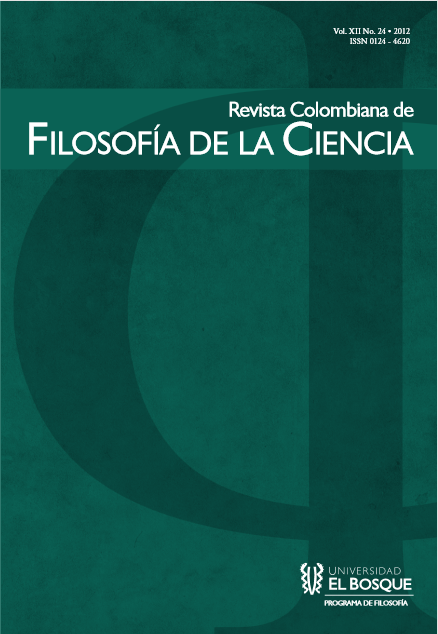La ilusión del cambio en un universo relativista atemporal
DOI:
https://doi.org/10.18270/rcfc.v12i24.1692Resumen
El objetivo de este trabajo consiste en analizar la posición de Julian Barbour, según
la cual vivimos en un universo atemporal, donde el devenir temporal y, con ello,
el cambio son sólo una gigantesca ilusión cósmica. Desde el punto de vista de la
física, se argumentará que su reconstrucción atemporal de la relatividad general
no es equivalente a la teoría general de la relatividad tal como fuera formulada por
Einstein. Desde un punto de vista filosófico, se considerarán las posibles motivaciones
del autor para postular un universo donde el tiempo y el cambio no son más
que apariencias subjetivas de una realidad atemporal.
Descargas
Referencias bibliográficas
Alexander, H. G., Ed. The Leibniz Clarke Correspondence, Nueva York: Barnes
and Noble, 1984.
Barbour, J. “The Emergence of Time and Its Arrow from Timelessness”. J. J.
Halliwell, J. Pérez-Mercader & W. H. Zurek, Eds., 1994.
—. “Mach before Mach”. J. Barbour & H. Pfister, Eds., 1995a.
—. “General Relativity as a Perfectly Machian Theory”. J. Barbour & H.
Pfister, Eds. (1995b).
—. “The Development of Machian Themes in the Twentieth Century”. J.
Butterfield, Ed. 1999a.
—. “A Talk with Julian Barbour”, Introducción y Entrevista de John Brockman,
Edge, 60 (1999b). http://www.edge.org/documents/archive/edge60.html.
—. The End of Time: The Next Revolution in Our Understanding of the Universe.
Oxford: Oxford University Press, 2000.
Barbour, J. & Bertotti, B. “Mach’s Principle and the Structure of Dynamical
Theories”. Proceedings of the Royal Society of London, Series A, 382 (1982):
-306.
Barbour, J. & Pfister, H., Eds. Mach’s Principle. From Newton’s Bucket to
Quantum Gravity. Birkhäuser: The Center for Einstein Studies, 1995. Einstein
Studies 6.
Bergson, H. “L’Evolution Créatrice”. Ouvres, Paris: Ed. du Centenaire, [1907]
Borzeszkowski, H. von & Wahsner, R. “The Stimulating Role of Two Misunderstandings”.
J. Barbour & H. Pfister, Eds., 1995.
Butterfield, J., Ed. The Arguments of Time. Oxford: Oxford University Press,
—. “The End of Time?”. British Journal for the Philosophy of Science, 53 (2001):
-330.
Castagnino, M. & Lombardi, O. “The Generic Nature of the Global and Non-
Entropic Arrow of Time and the Double role of the Energy-Momentum
Tensor”. Journal of Physics A (Mathematical and General), 37 (2004): 4445-
—. “The Global Non-Entropic Arrow of Time: from Global Geometrical
Asymmetry to Local Energy Flow”. Synthese, 169 (2009): 1-25.
Castagnino, M., Lombardi. O. & Lara, L. “The Global Arrow of Time as a
Geometrical Property of the Universe”, Foundations of Physics, 33 (2003):
-912.
Earman, J. World Enough and Space-Time. Cambridge MA: The MIT Press,
Halliwell, J. J., Pérez-Mercader, J. & Zurek, W. H., Eds. Physical Origins of
Time Asymmetry. Cambridge: Cambridge University Press, 1994.
Hawking, S. & Ellis, G. The Large Scale Structure of Space-Time. Cambridge:
Cambridge University Press, 1973.
Hoefer, C. “Einstein’s Formulations of Mach’s Principle”. J. Barbour & H.
Pfister,Eds., 1995.
Isenberg, J. “Wheeler-Einstein-Mach Spacetimes”. J. Barbour & H. Pfister,
Eds., 1995.
Isham, C. “Canonical Quantum Gravity and the Problem of Time”. Los
Alamos Archive, arXiv: gr-qc/9210011, 1992.
Isham, C. “On the Emergence of Time in Quantum Gravity”. J. Butterfield,
Ed., 1999.
Kuchař, K. Intervención en “General Discussion: What is the Machian
Program?”. J. Barbour & H. Pfister, Eds., 1995.
Lombardi, O. “La Construcción del Tiempo en Russell”. Revista Latinoamericana
de Filosofía, 23 (1997): 211-237.
Mach, E. The Science of Mechanics: A Critical and Historical Account of Its
Development. 6ª ed. Illinois: Open Court, [1883] 1960.
Mosterín, J. & Torretti, R. Diccionario de Lógica y Filosofía de la Ciencia.
Madrid: Alianza Editorial, 2002.
Newton, I. Principios matemáticos de la filosofía natural. Madrid: Alianza
Editorial, [1687] 1987,
Norton, J. “General Covariance and the Foundations of General Relativity”.
Reports on Progress in Physics, 56 (1993): 791-858.
—. “Mach’s Principle before Einstein”. J. Barbour & H. Pfister Eds., 1995.
Poincaré, H. Science and Hypothesis. Londres: Walter Scott Publishers, [1902]
Pooley, O. “Relationalism Rehabilitated? II: Relativity”. Pittsburgh PhilSci
Archive, 2002.
Pooley, O. & Brown, H. (2002), “Relationalism Rehabilitated? I: Classical
Mechanics”. The British Journal for the Philosophy of Science, 53, 183-204.
Russell, B. Our Knowledge of the External World. Londres: Routledge, [1914]
—. Human Knowledge. Its Scope and Limits. Londres: Routledge, [1948] 1994.
Schutz, B. Geometrical Methods of Mathematical Physics. Cambridge:
Cambridge University Press, 1980.
Sider, T. Four-Dimensionalism: An Ontology of Persistence and Time. Oxford:
Clarendon Press, 2001.
Sklar, L. Space, Time and Spacetime. Berkeley: University of California Press,
Descargas
Publicado
Cómo citar
Número
Sección

| Estadísticas de artículo | |
|---|---|
| Vistas de resúmenes | |
| Vistas de PDF | |
| Descargas de PDF | |
| Vistas de HTML | |
| Otras vistas | |











